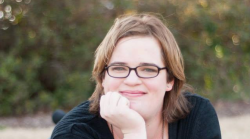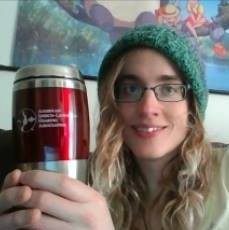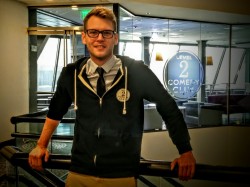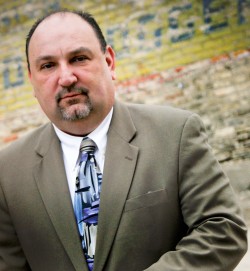Culture | November 22nd, 2016

Last April, controversial comedian Ralphie May found himself in a sticky situation after an old joke concerning Native Americans surfaced, resulting in the cancellation of a gig in Bemidji. As a result, shows in Fargo, Sioux Falls and Burnsville were postponed “out of respect for the Native American community and safety for all parties,” according to a statement issued by promoter Jade Presents.
Ralphie May made his apologies and is coming back to Fargo next month--but he’s certainly not the first and certainly not the last comedian to offend. Contemporary comics such as Williams and Ree, Dave Chapelle, Bridget Everett and so many more have tackled race and sex.
We had the chance to talk with Darcy Corbitt, GLBTQ advocate and Graduate Teaching Assistant in Psychology; Faye Seidler, ND Safezone Spokeswoman and HPR columnist; Zachary Tooker, Manager of Level 2 Comedy Club in Fargo; Lexi Byler, speaking on behalf of Black Lives Matter Fargo-Moorhead; and Dave Lanpher of the North Dakota Human Rights Coalition.
High Plains Reader: We try to maintain our political correctness P's and Q's as best we can, so when comics make racial generalizations in their comedy acts, are we progressing or anachronistic on the issues of racism and sexism?
Darcy Corbitt, PhD candidate: It’s a tough call to make. On the one hand, there is value in laughing at stereotypical generalizations, not because we believe them to be true, but because they are ridiculous. On the other, these types of jokes usually go over the heads of the very people who believe them to be true. In general, non-minorities should not make jokes about minority groups. I had a professor once who said, “Political correctness is simply treating people with respect.” Making racist, sexist, or anti-LGBTQ-charged jokes as a person of privilege is harmful.
Faye Seidler, Safezone Spokeswoman: Comedy is sacred and anything can be a joke. We use humor to subvert our reality and make observations about things that are both mundane and taboo. Comedy is in some ways the only way we can really talk about big issues, because through the medium of comedy we can explore, accept, or change the worst of our humanity in a way that doesn't make us shut down. That is what makes it so valuable and so sacred. However, not all comedy is equal. Some people use the medium to subvert stereotypes and others use it for hack-level shocks.

Zack Tooker, Manager, Level2 Comedy: Racial stereotyping for laughs is certainly not original. Most of the time, these “unfiltered” comedians are relying on something that everyone has already heard. Familiarity isn’t what the art form is about. Putting others down is not what the art form is about. People’s reactions to these jokes are changing. If the consensus is that generalizations of race (or sex) aren’t funny anymore, then you can’t blame the people for not laughing. You need to blame the comic for relying on unfunny material.
Lexi Byler, Black Lives Matter: Typically, if you have to be racist or sexist to be funny, then you're probably not all that funny. Comedy can be used to bring attention to racist and sexist issues, and when done correctly can be both hilarious and make a valid point. However in general, making racist jokes is a cheap way to get laughs.
Dave Lanpher, ND Human Rights Coalition: One of my favorite comics is an insult comic, Lisa Lampanelli. I don’t mind insult comics--that doesn’t bother me. I know that’s part of her comedy. I go there for the entertainment. It’s entertainment for me--it’s not David Duke saying that, it’s not somebody who’s not trying to be funny.
HPR: Are these bits perpetuating stereotypes or are we learning to laugh at ourselves?
Darcy Corbitt: If the comedian is of that ethnic group, then the joke is really on the people who believe it to be true. In these cases, the person making the joke is doing so to make a point. When white people make jokes about people of color, they are usually not doing so from a good place, nor do they have the personal experience necessary to make that joke salient.
Zach Tooker: Comedy isn’t about mocking the less fortunate, or exploiting stereotypes for laughs. Do comedians do it? Yes, the sh**ty ones. Good comedians, much like authors, just want to hold a mirror up to society, in which we can look at ourselves and laugh.
Lexi Byler: It's hard to generalize when it comes to comedy. There's times where it's okay to laugh at ourselves, and certain jokes are more innocent than others. If there's a joke that makes light of a serious issue in marginalized communities, then it perpetuates stereotypes. Overall, stereotyping doesn't belong in comedy. If you have to make fun of people's identities to be funny, then you're probably not very funny.
Dave Lanpher: If I go to see that person I know what I’m buying to go see. To me, I have bought that ticket. I think the stereotypes are already there. I don’t think they are being perpetuated or made worse.

HPR: Are these jokes as appropriate offstage as they are onstage--and why?
Faye Seidler: Implying there is a difference between onstage and off stage implies there is a level of protection in performance; that you're free from critique because you're just "joking.” The thing is, everything can be a joke, but no communication is protected from criticism. If someone says something racist on stage, it is just as bad as saying it offstage. But looking at comedy as appropriate or not is a bad way to look at it. Comedy needs the capacity to be deeply inappropriate to tackle taboos. I look at jokes first to see if they're funny, to see if they challenge me, to see if they surprise me, or if they perfectly had my number and I say, 'yeah that's me.’
Zach Tooker: If a comedian is going to paint themselves onstage as being a racist or sexist individual, more than likely that is what people will think of them offstage as well. On or off stage doesn’t make any difference, but some comics argue “I’m not racist, I’m playing a character.” Well, if that’s the case, it has to be obvious to the audience.
Lexi Byler: Racist jokes are more inappropriate on stage because there's an audience that can be influenced. If you tell a racist joke to one person off stage, then only that person is capable of being influenced. But when you say that same racist joke in front of an audience, then there's a chance a large number of people may leave thinking racist jokes are okay.
Dave Lanpher: Telling those kind of jokes in the privacy of a small group among friends, ethnic jokes, or locker room humor perpetuates stereotypes. That’s the damage. Humor onstage that promotes a stereotype can also be used to break down the stereotype: make it so exaggerated that it becomes farcical, so people see how dumb it is. That’s what Lisa Lampanelli does. It’s so offensive it’s laughable.
HPR: It's a tough call--where do we draw the line on where or how we are offended? As a comedian, where is the line drawn? And as an activist, what makes you cringe?
Darcy Corbitt: We need to listen to our internal sense of right and wrong. If we feel offended, then it probably was in poor taste. I am not a comedian, so I can’t really say where they ought to draw the line. I know when I speak, I only make jokes about stereotypes within groups I am a part of, and make sure I tie it in with a strategic message about why those stereotypes are wrong. Jokes about ethnic minorities from white people, about LGBT people from non-LGBT people, make me cringe.

Faye Seidler: As someone who uses comedy as part of education, I dislike laziness. A joke where it turns out the woman is actually a man is a lazy joke. It is a cliché and takes no effort and accomplishes nothing. It translates to, 'ha, trans people.’ Does that mean trans individuals can't be the subject of a joke? Absolutely not, just make better jokes. My go-to joke is one where I say that I transitioned just so people would stop asking me about sports and cars. I don't cringe when people are making comedy. I cringe when people make their hatred look like comedy.
Zach Tooker: There is no such thing as a line in comedy, it’s art. It’s meant to entice a response. We, as individuals, must decide whether we want to laugh. The rest will work itself out.
Lexi Byler: From my own experience, there are lot of sexist jokes made by comedians, especially amateur comedians. There are ways to make valid points about diverse communities in a funny way, without tearing down their identities in a negative way to get laughs. It's a fine line to walk. If you have to be racist or sexist to be funny, then you're most likely not very funny or creative.
Dave Lanpher: I don’t know if humor makes me cringe. People of power, people of influence, people who can shape our community--when they make offensive comments, that’s what makes me cringe. The city commissioner that says hateful things--that impacts my community, not bringing a comedian in for one night to do a show, who says a few things that may be off color or inappropriate.
HPR: What are your feelings about those who consider themselves equal opportunity haters, and pick on all stereotypes?
Darcy Corbitt: If they define themselves as a person who hates, then they need to reevaluate their identity.
Faye Seidler: Everything can be made a joke and there is nothing inherently wrong with making observations outside your gender or race. But more times than not, people use that line of equal-opportunity hater as a shield from criticism. They use that line because their material is blatantly offensive for the sole sake of being offensive, and that's the best they can do for comedy. The thing is, if your jokes involve a group of people as the punchline, they are bad comedy. Regardless of it being offensive or unjust, if you look at it from a comedic angle, it is lazy. Saying women are bad drivers is a cliche, it has been done, big whoop. Saying you saved a bunch of money on your car insurance by transitioning to a woman, now that's novel.

Zach Tooker: The phrase ‘equal opportunity hater’ is a defense mechanism. Take the high school clown as an example. He or she would bust everyone’s chops, but didn’t have much substance or personality, outside of making fun of others.
Lexi Byler: An "equal opportunity hater" is an absurd term. If you have to resort to hatred to be funny, you lack creativity and real humor.
Dave Lanpher: It’s harder when you’re a white male to do that. I’m a white middle-aged male. I’ve never been discriminated against. I’ve never felt that and that’s why it’s offensive to people.
Sometimes we get so politically correct that we don’t allow for humor. We get all bent out of shape on things. Somebody bought a ticket to see that because they knew what they were going to see, and either we’re about free speech or we’re not. I don’t have to like it--then I won’t buy a ticket.There are a lot of things that have to do with free speech right now that I don’t like. I don’t have to like it, I don’t have to read it, I don’t have to fill my head with it.
February 23rd 2026
February 16th 2026
February 13th 2026
January 15th 2026
January 15th 2026
__293px-wide.jpg)

_(1)_(1)_(1)_(1)_(1)__293px-wide.jpg)

__293px-wide.png)
